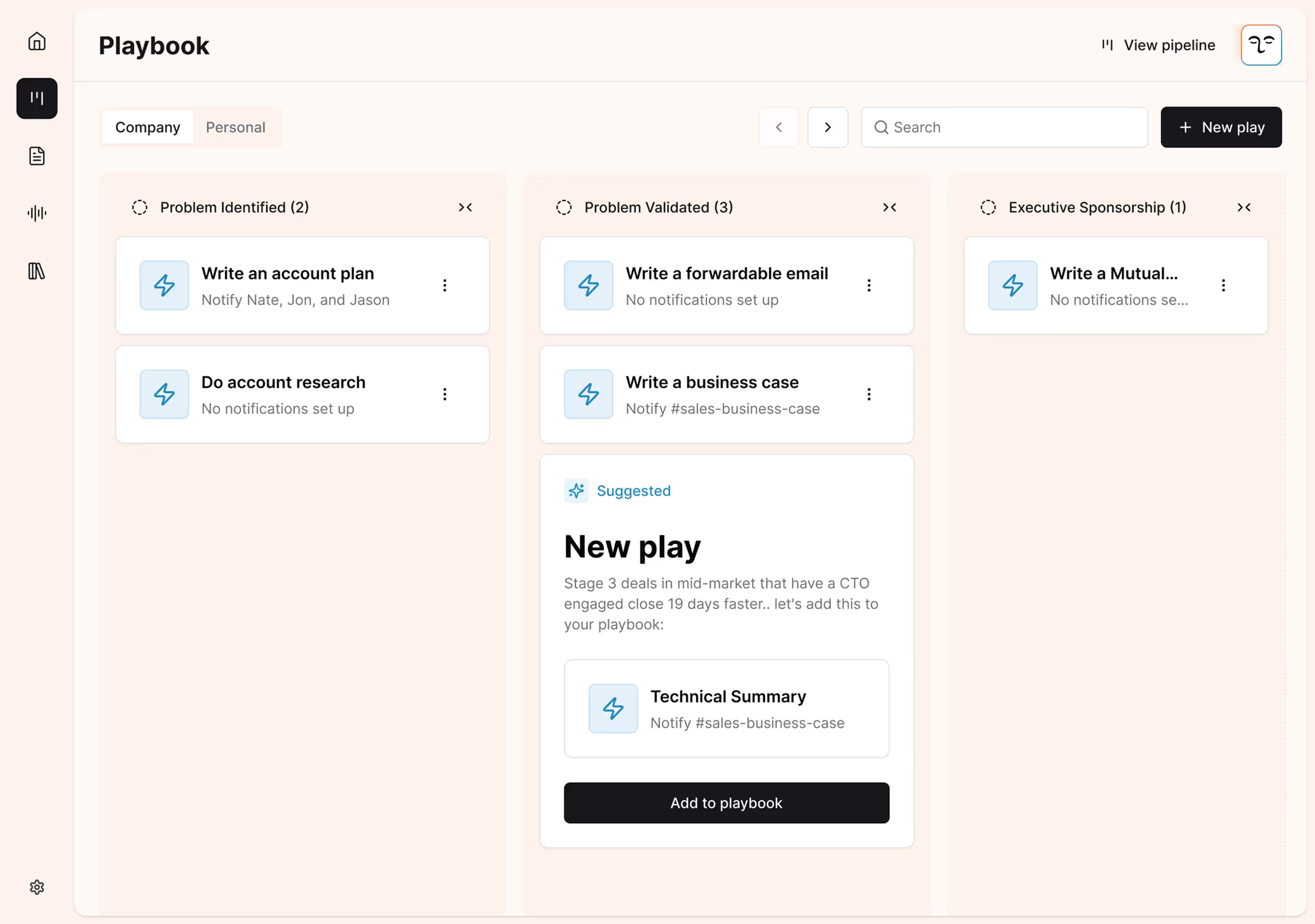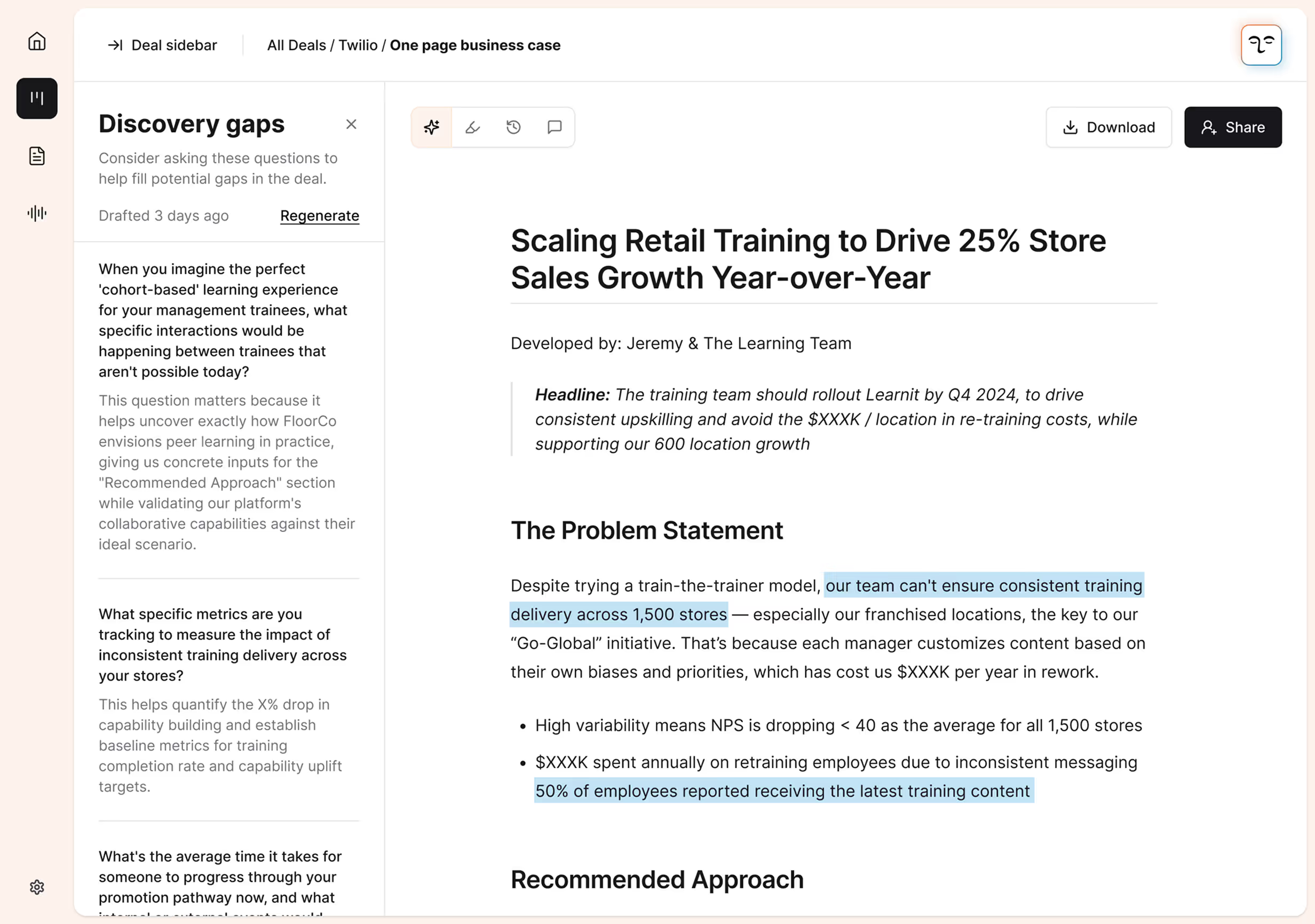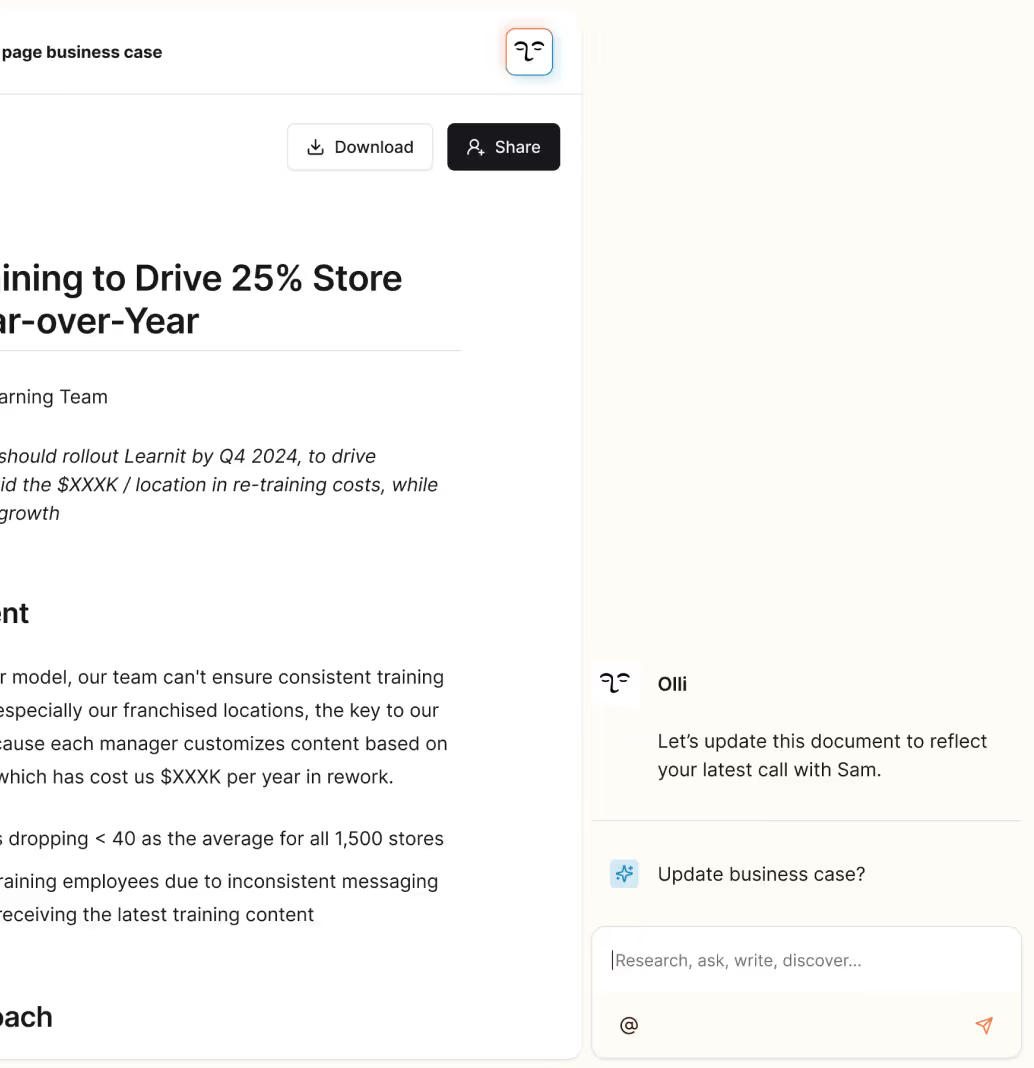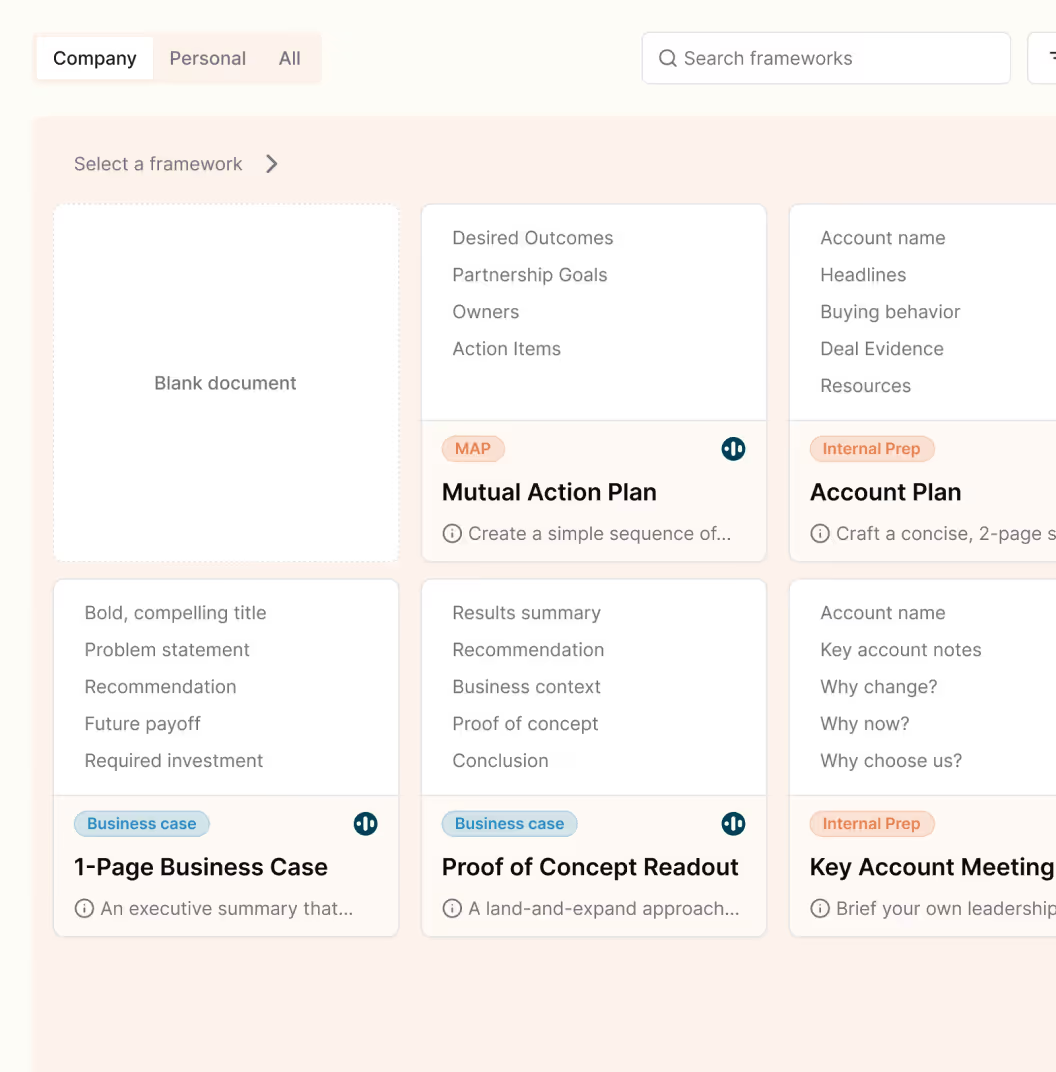Treat every account like a key account with the sales playbook that writes itself (literally)
Complex deals stall when they’re built on templates that can’t adapt. Scale an account-based sales process with highly-tailored plays that learn from and build on each other: point-of-view → account plan → executive summary → demo strategy → deal review → onboarding + expansion brief. For every deal.

If you’re selling mid-market or enterprise, you need Fluint
Revenue teams converting their hard-earned pipeline, and reps winning > 50% of their qualified opportunities











No need to build 30+ agents, using 7+ tools, and 198 prompts...
Olli is the only AI Agent who comes fully ramped. Built with all the tools and training you need to simplify complex sales. So you don’tneed to buy, configure, train, anddeal with you know… more complexity. Ready to:
Get the must-know details on top deals
Get a 60-second summary of the top risks, stack-ranked with a gameplan of what to do next.
Craft executive-ready messaging
Resonate at the highest levels with a point of view built around each exec’s specific priorities.
Break into your top accounts
Spot hard-to-find compelling events and build a strategy to break into your target accounts.
Make your deal gaps visible
Find and fill hidden deal gaps early—before it’s too late. Using written docs that highlight what’s missing, and get you 60-second briefs on top risks.

We have a bunch of tools, but none of them have had a bigger impact on our GTM efforts than Fluint. And it's not even close.
The best part here is how much faster our deals are closing when you consider that there are more stakeholders involved than we've ever experienced.
Stop losing when your team’s not in the room
Script your champion’s message during internal buying meetings,with tailored business cases that write and update themselves. Built with your buyer’s own words, targeting their executive’s specific priorities.
Clear Point of View
Value-based messaging built with your buyer’s words for their execs.
Guided Multithreading
See a breakdown of who to target, what to say, and when.




Get your deal team on the same page (literally)
AE’s get a tailored point-of-view. SE’s get pre-demo briefs. CS gets handoff docs. Sales leaders get 60-second deal reviews. The right deal content tailored for each GTM role.
Integrated into your stack.
All content pushed back into your CRM and native tooling.
Role-specific frameworks.
Handoffs for post-sales, deal and demo briefs for pre-sales, and more. With a ready-built library, or bring-your-own frameworks.
Teams on Fluint drive 10.4x more sales velocity
We’ve got the data to prove it. But it shouldn’t be all that surprising. Your top reps are likely already driving 10 - 12x the average rep on your team.
Higher win rate
Driving executive engagement by Stage 2 & 3 to boost win rates
Faster deal cycle
Cut your time in procurement, and late-stage deal stall
We have a bunch of tools, but none of them have had a bigger impact on our GTM efforts than Fluint. And it's not even close.

Cut your #1 pipeline killer
See how revenue teams are converting their hard-earned pipeline, and winning > 50% of qualified opportunities, by selling with Fluint.
From what I’ve seen, there’s really no better resource than Fluint right now for supporting your buyer through a complex buying process.

Increase to ACV
Tying deals to buying priorities = less discounts + more value
No need to builds 30+ agents, with 7+ tools, and 198 prompts...
Olli is the only AI Agent who comes fully ramped. Built with all the tools and training you need to simplify complex sales. So you don’tneed to buy, configure, train, anddeal with you know… more complexity. Ready to:
Research top accounts
Spot hard-to-find compelling events and build a strategy to break into your target accounts.
Multi-thread the right contacts
Get the right buying roles and personas engaged early, to stop deals from slipping late.
Monitor top deal risks & threats
Get a 60-second summary of the top risks, stack-ranked with a gameplan of what to do next.
Craft executive-ready business cases
Resonate at the highest levels with messaging built around each exec’s specific priorities.
Brief internal GTM team
Show leaders, CS, sales engineers and others exactly what they need to know.
Identify upsell & cross-sell opportunities
Treats every account like a key account, with tailored plays that build on each other.
Got questions? We got you.
Scan some quick answers here, or book a time to chat 1:1
How to Get Started with Fluint
Fluint is a sales execution platform built for complex B2B sales. Instead of focusing only on what happens in sales meetings, Fluint enables your champions to sell during internal conversations you’re not in the room for (where 90% of buying decisions are made). Using tailored content, written in their voice, instead of generic enablement content buyers don’t read or share.
If you’re working on complex deals (multiple buying personas and use cases, or you’re moving upmarket into larger deals), Fluint’s built for Account Executives and Sales Leaders at B2B SaaS and services firms.
Use Fluint to:
- Build tailored, executive-level business cases
- Collaborate with champions inside target accounts
- Standardize deal execution across their internal GTM team
Yes. Fluint has pre-built integrations with all the major sales platforms like Salesforce, HubSpot, Gong, Clari and Salesloft to keep total implementation time under 30 minutes of IT time.
You can also use our call recording solution, or start lightweight: just copy and paste call transcripts from Zoom, Teams, Google Meets or your own notes directly into Fluint.
Or, use our Zapier integration to bring in anything you like. No heavy implementation required.
Yep, you can go ahead and get started with your own account. There's no admin-level setup required (you can copy and paste in call transcripts without any integrations, or use a Fluint notetaker).
Plus, your commission from a single closed deal will more than pay for your whole year’s subscription.
You can build your first business case in < 5 minutes. Here’s the process:
1. Upload any notes and/or call transcripts as context.
2. Pick a framework from the Fluint library. Then click “generate.”
3. Fluint writes your first draft in 30 seconds, using your buyer’s own words.
4. We’ll analyze any discovery gaps and make suggestions.
5. Share your workspace with your champions for feedback & build together.
There you go.
We have a 30-day, no-questions-asked refund guarantee.
So if you’re not happy with the platform for any reason in your first 30 days, we’ll return your first subscription payment.
Just send an email to support@fluint.io with the subject line “Refund Guarantee.”
Why Fluint's Sales Enablement is Different
Most sales enablement tools store template content that’s generic and used across deals.
So Fluint’s focused on a different approach: influencing the 90% of buying conversations sellers aren’t in the room for. By writing account-based content like business cases, account plans, and mutual action plans based on the actual discovery you’ve done, stored in your call recordings, email threads, and notes.
Because we capture each buyer’s unique voice, every piece of content generated by Fluint sounds like them — not your marketing team. To make sure your buyers actually read, love and share it internally.
You can save template images and materials. But you'll want to go beyond templates, to creating net new content with each champion, that’s specific to their account.
To make sure your champions actually use your content to sell internally. Using materials like executive summaries, business cases, competitive comparisons, and multithreading emails.
Consolidation is good. But only if your tech stack’s already closed the single, biggest gap in every sales process: Guiding the internal buying conversations sales reps aren’t part of.
Which is where 90% of B2B buying happens. Yet, most tech stacks only focus on sales reps in sales meetings. Which means even after consolidating tech spend, you’d focus all that reduced spend on just a fraction of where deals are won or lost.
No, if you use Gong, Chorus, Salesloft, or another tool, you’ll keep it in place. These tools coach your pitch during sales conversations.
Fluint creates content to guide your buyer’s internal meetings. They’re different use cases.
We just use the call transcript from these systems as a data source.
Meet Olli: Fluint's AI Agent for Complex Deals
Olli is Fluint’s AI agent, specifically designed to help you win complex B2B deals.
Instead of just summarizing what’s already happened, Olli diagnoses why your deals are stuck, based on a model of your own closed-won data, and then actually does the work to get them unstuck with you. Building out specific plays to equip your champions, and drive deals forward.
Olli guides reps through every stage of the deal to close faster by:
- Flagging risks in your pipeline (stalled deals, skeptics, blockers)
- Generating buyer-ready content in your customer’s own words
- Surfacing gaps in discovery so sellers can fill them before deals stall
- Guiding champions to carry your message into internal meetings
The result: more deals moving forward, and fewer slipping at the finish line.
Most teams do start here. Then they realize ChatGPT and Gemini aren’t ideal. The biggest reason is sellers don't stick with it. All the copying over inputs for each deal, then getting output that's not sales-specific and ready to use, is frustrating.
Which means there's no consistent execution inside deals. For example:
What percent of your sellers have used ChatGPT before? Likely a lot of them.
What percent of your deals have a business case? Likely very little of them.
Still have questions?
Let's dig into your use case live. We'll make sure you leave with clear answers:


